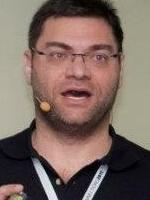

Teach Coding and Robotics for Grades 1-12 with Confidence |
Participate and share : Poster
Andreas Tsouchlaris
Computational thinking starts in Grade 1 and goes up to Grade 12 with a carefully graded age-appropriate curriculum. Step-by-step lesson plans for teachers without prior knowledge. Explore the new Digital Kids/Teens Second Edition series with the free Can Code and Robotics eBooks.
| Audience: | Teachers, Chief technology officers/superintendents/school board members, Curriculum/district specialists |
| Skill level: | Beginner |
| Attendee devices: | Devices not needed |
| Topic: | Computer science & computational thinking |
| Grade level: | PK-12 |
| Subject area: | Computer science, STEM/STEAM |
| ISTE Standards: | For Students: Computational Thinker
|
Computer Science, Computing, or ICT: different names for the same topic in all schools worldwide. Computational thinking is now a part of the CS curriculum, and it should be appropriately covered in all grades.
Teachers who want to teach coding and/or robotics will be able to understand the importance of graded lesson plans and resources. The curriculum must follow a spiral, project-based approach based on the age and school grade of the students.
They will learn how to choose coding tools and educational robots based on the time available per week, the students' existing skills, and the current trends in CS education.
The Digital Kids and Digital Teens curriculum is field-tested in more than 50 countries. The feedback we have received from teachers and students is integrated into the second edition of the series. Customized editions of the material are approved and used by Ministries of Education worldwide for the subject of Computing and ICT.

Andreas Tsouchlaris has a passion for education and technology with 36 years of experience through a range of roles in Binary Logic and MM Publications. He has been working as an educational technology consultant and curriculum developer with various schools, universities and Ministries of Education on e-learning and Computing-ICT projects in countries as diverse as Peru, China, Saudi Arabia and Greece. He has studied Electrical and Computer Engineering at the National Technical University of Athens and Human-Machine Interaction for UX Design at the MIT CSAIL. He holds an MBA from the University of Kent.